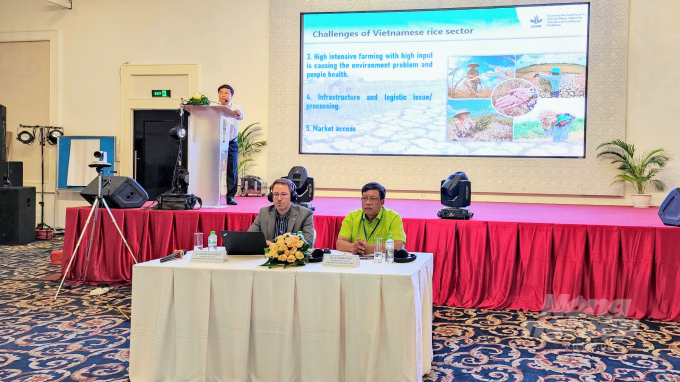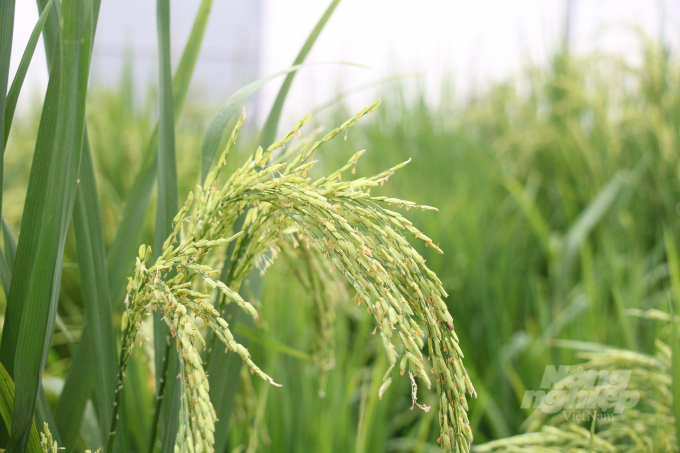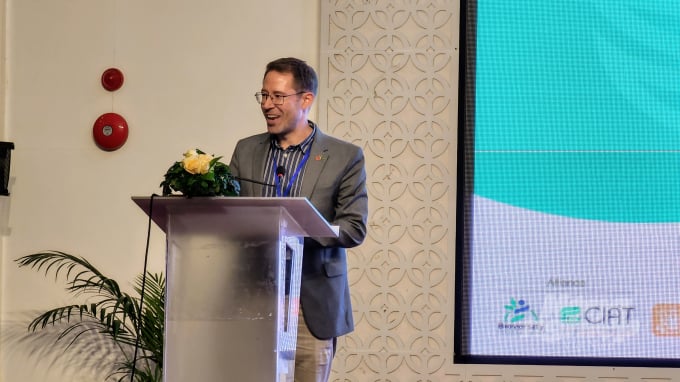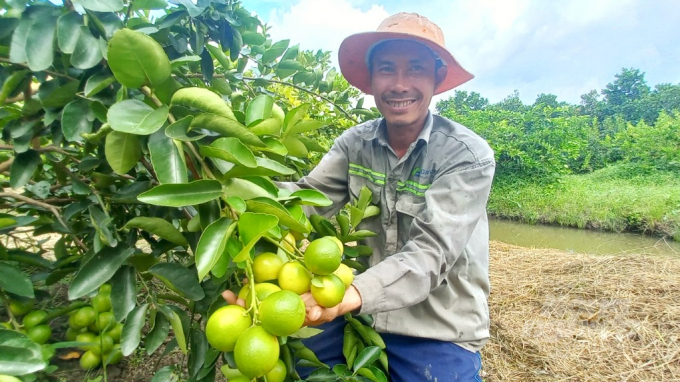May 17, 2025 | 08:17 GMT +7
May 17, 2025 | 08:17 GMT +7
Hotline: 0913.378.918
May 17, 2025 | 08:17 GMT +7
Hotline: 0913.378.918
The “Securing the Food Systems of Asian Mega-Deltas for Climate and Livelihood Resilience” Initiative (AMD) initiative is the one that aims to create resilient inclusive and highly productive mega-deltas in Asia.

The “Securing the Food Systems of Asian Mega-Deltas for Climate and Livelihood Resilience” Initiative (AMD) initiative was launched on June 28 in the Mekong Delta city of Can Tho. Photo: Kim Anh.
The mega-deltas in Asia, home to 177 million people, of which 36 per cent are poor, include the Mekong Delta. These areas are considered as a "launching pad" for food production, biodiversity, fertility and high productivity, mainly rice, fishing and aquaculture, supporting millions of people living in and beyond the plains.

The great plains of Asia are "launchers" for food production. Photo: Kim Anh.
However, the food systems in these deltas are being severely impacted by climate change that slows down economic growth and "erodes" food security.To address these pressing concerns, CGIAR, together with development centres and partners, officially announced the AMD Initiative.
The AMD initiative will focus on three major Asian deltas including the Ganges-Brahmaputra Delta in Bangladesh and India, the Irrawaddy Delta in Myanmar, the Lower Mekong Delta in Vietnam and Cambodia.
Dr. Bjorn Ole Sander, Representative of the International Rice Institute (IRRI) in Vietnam and Head of the AMD Initiative highlighted the role of Asia's great deltas as "food baskets" for countries in the region.

Dr. Bjorn Ole Sander, Chief Representative of the International Rice Institute (IRRI) in Vietnam emphasised the role of Asia's great deltas. Photo: Kim Anh.
The main goal of the AMD Initiative was to make these deltas capable of maintaining ecological integrity, adapting to climate and other shocks, and removing systemic barriers for scaling up transformative technologies and practices at community, national and regional levels, he said.
To achieve the above goal, CGIAR centres and their partners would focus on priority areas such as product system suitable for delta regions, nutrient rich delta agricultural product system, value chain low-risk delta-oriented management, comprehensive delta systems management, gender equality and inclusion, and evidence-based delta development planning.
Nguyen Hong Son, Director of the Vietnam Academy of Agricultural Sciences said that the Mekong Delta region was the greatest rice bowl of Vietnam but facing more natural difficulties than other economiczones.
In particular, the agricultural production of the region was facing many challenges due to climate change, which affected food production and the livelihoods of people in the region.

Farmers change crop structure to adapt to climate change. Photo: Kim Anh.
Son pointed out the fact that since 2015, farmers in the Mekong Delta have started shifting from rice production to other crops and fisheries to adapt to climate change and market fluctuations. Currently, local farmers are transforming farming models to reduce production costs, convert inorganic to organic agricultural production, reduce yield pressure, and increase income.
Determining the Mekong Delta is a key rice production bowl to keep. Son set out a series of priorities for the region in the coming time, especially focusing on its ecological system, turning the Mekong Delta into eco-tourism areas in agriculture. At the same time, making use of agricultural by-products is an important solution to create added value and increase income for farmers.
Moreover, with the Government's Resolution 120 on sustainable development of the Mekong Delta to adapt to climate change, main products of the Mekong Delta must be identified and. Vietnam will improve its ability to control the quality of agricultural products and access markets.
Le Thanh Tung, Deputy Director of the Department of Crop Production (MARD) assessed that, through the AMD Initiative, the cultivation industry would closely coordinate with CGIAR centres, promoting experience from co-operation programmes in the past, especially a participatory and partner-empowering approach in research and development.

Le Thanh Tung, Deputy Director of the Department of Crop Production determined AMD initiative would linking deltas together. Photo: Kim Anh.
“With the goal of building resilient and inclusive deltas throughout the region and in the vicinity of the Mekong River region, the AMD initiative is no longer within the scope of the rice-growing plains, but can link the deltas together," said Tung.
Opportunities and challenges of the key areas of the AMD Initiative were also discussed. The initiative was expected to be expanded.
Translated by Hien Anh
![Multi-channel, multi-directional Vietnamese agricultural markets: [7] Deep processing makes global reach easy](https://t.ex-cdn.com/nongnghiepmoitruong.vn/608w/files/huytd/2025/05/16/2946-che-bien-sau-chia-khoa-vang-nang-tam-nong-san-viet-tren-ban-do-the-gioi-080603_110-093858.jpg)
(VAN) The application of deep processing technology is helping Vietnamese agricultural products enhance their value, create competitive advantages, and open doors to conquer global consumers.
![Multi-channel, multi-directional Vietnamese agricultural markets: [6] Agri products go online](https://t.ex-cdn.com/nongnghiepmoitruong.vn/608w/files/content/2024/12/10/1-113313_954.jpg)
(VAN) Bringing agri products onto e-commerce platforms is an effective way to build a brand that many businesses, cooperatives, and agricultural production households are doing.

(VAN) Veterinary training should focus on quality, not just quantity. Veterinarians also need more options to pursue specialized training.

(VAN) The veterinary industry needs to be viewed objectively and further invested in to properly demonstrate its role and importance in the new context.

(VAN) The number of veterinarians graduating each year is not enough to meet actual needs, hence a difficult problem for the growing livestock industry.

(VAN) The strategic partnership between Cambodia, the Philippines, Vietnam, and CGIAR ensures that innovative solutions effectively address national priorities for food system development.

(VAN) This was affirmed by the UK Minister of State at the Department for Environment, Food and Rural Affairs during a working session with Deputy Minister Tran Thanh Nam on May 13.